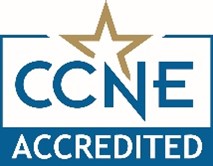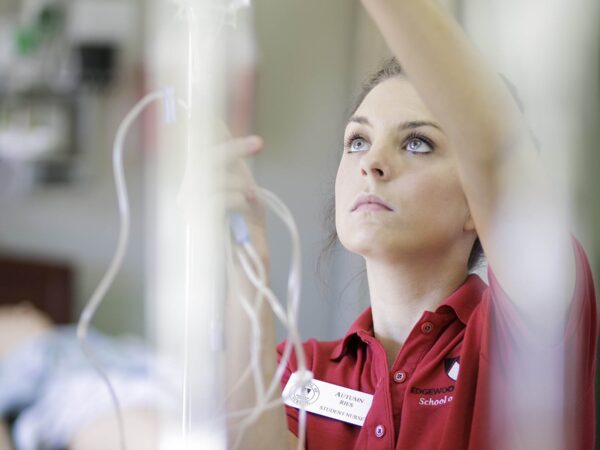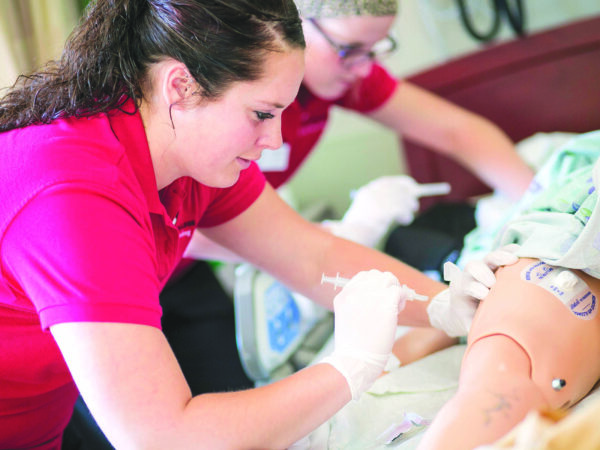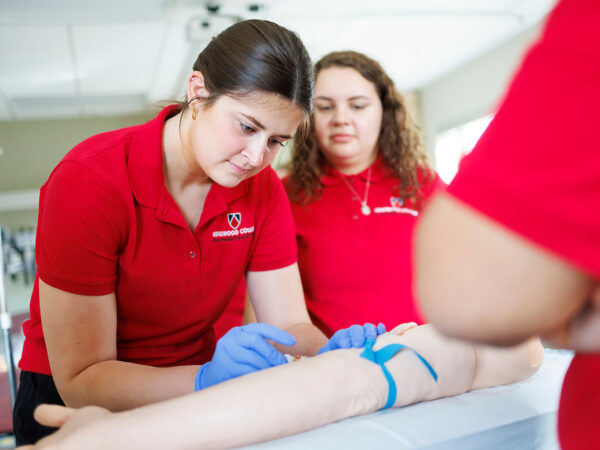Post-Master’s CertificatePsychiatric Mental Health Nurse Practitioner Henry Predolin College of Health Sciences
Prepare for PMHNP Certification
The Psychiatric Mental Health Nurse Practitioner (PMHNP) Post-Master’s Certificate at Edgewood University equips master’s-prepared nurses to expand their practice and provide psychiatric, emotional, and behavioral healthcare across the lifespan. Delivered in a fully online, asynchronous format, the program is designed for working professionals who want to advance their clinical expertise while balancing career and personal commitments.
Most students complete the certificate in about 2.5 years, depending on prior coursework. Clinical placements are arranged in collaboration with you to ensure relevance to your goals and physical location. Throughout the program, you’ll learn from expert faculty in a supportive, mission-driven community with a strong tradition of nursing excellence.
Graduates are eligible to sit for the Psychiatric Mental Health Nurse Practitioner certification exam (PMHNP-BC™ or PMHNP-C™) through either the American Nurses Credentialing Center (ANCC) or the American Academy of Nurse Practitioners (AANP).
Global
Virtual
27-36
Career Trends
$132,050
Average annual salary for a Nurse Practitioner
40%
Projected employment growth rate from 2023-2033
One in five adults in the U.S. lives with a mental illness, according to the National Institute of Mental Health. Because mental illness touches every aspect of life including relationships, work, and overall well-being, the demand is growing for Advanced Practice Nurses who can diagnose, treat, and support patients with both clinical expertise and compassion.
Bring excellence in psychiatric care to the places that need it most. As a PMHNP, you will be ready to serve in diverse clinical settings such as:
- Primary Care and Specialty Clinics
- K-12 Schools and College Campuses
- Community Mental Health Centers
- Hospitals and Integrated Care Teams
1
Total Start
750
Clinical Hours
2.5
Years to Completion
Featured Courses
This course is designed to provide advanced practice nursing students with the knowledge of basic diagnostic criteria of commonly treated major psychopathological disorders as well as an introduction to establishing therapeutic rapport and conducting a psychiatric interview in the role of a psychiatric mental health nurse practitioner. Building upon this knowledge, the student will become familiarized with the most common therapy modalities and engage in deeper study of modalities most often utilized within the field as a psychiatric prescriber.
NRS 693 – Diagnostics, Management, Psychopharmacology & Evidence-Based Treatment I
This course is designed to provide advanced practice nursing students with scaffolding knowledge in diagnostics, psychopharmacologic & nonpharmacologic management and evidence-based treatment of major psychopathological disorders. This is the first course in progressive sequence of three courses. In this first course, students will focus on the etiology, epidemiology, evidence-based treatment, and management of neurodevelopmental disorders, schizophrenia spectrum and other psychotic disorders, depressive disorders, bipolar and related disorders, and anxiety disorders.
NRS 696B – Transition to Psychiatric Mental Health Practice
This course is designed for PMHNP students to support their transition confidently to practice as independent advanced practice registered nurses. Students will focus on leadership, quality improvement, safety, health policy, and regulatory bodies important to practice. We will also review in greater depth clinical topics pertaining to role of the PMHNP (collaboration, consultation, therapeutic relationships) as well as preparation for PMHNP board certification.
Program Curriculum
| Course # | Course Title | Credit Hours |
|---|---|---|
| NRS 680 | Differential Diagnosis | 3 |
| NRS 692 | Introduction to Psychotherapy/Psychiatric Interviewing & Common Major Psychopathological Disorder Basics | 3 |
| NRS 693 | Diagnostics, Management, Psychopharmacology & Evidence-Based Treatment I | 3 |
| NRS 694 | Diagnostics, Management, Psychopharmacology & Evidence-Based Treatment II | 3 |
| NRS 695 | Diagnostics, Management, Psychopharmacology & Evidence-Based Treatment III | 3 |
| NRS 696A | Equity and Management of Mental Healthcare in Diverse Populations | 1.5 |
| NRS 696B | Transition to Psychiatric Mental Health Practice | 1.5 |
| NRS 701 | Advanced Pathophysiology | 3 |
| NRS 702 | Advanced Physical Assessment | 3 |
| NRS 703 | Advanced Pharmacology | 3 |
| NRS 714 | Clinical Practicum I: Psych Mental Health Nurse Practice – Family | 3 |
| NRS 715 | Clinical Practicum II: Psych Mental Health Nurse Practice – Family | 3 |
| NRS 716 | Clinical Practicum III: Psych Mental Health Nurse Practice – Family | 3 |
Mission information, course description and scheduling and accreditation information can be found in the MSN Handbook.
Admission Process
Applicants to the School of Nursing’s Master of Science in Nursing programs and the PMHNP Post-Master’s Certificate must meet the general graduate admission requirements, along with the following additional criteria:
- Provide evidence of a baccalaureate and masters (or more advanced degree) from a nursing program accredited by a national nursing accreditation body with a cumulative grade point average of at least 3.0 on a 4.0 scale for regular admission status. The cumulative grade point average is computed on the highest degree held at the time of application to the Edgewood University graduate program.
- Possess a current, unencumbered license as a registered professional nurse.
- Complete and submit online graduate application.
- Request that official transcripts for all undergraduate and graduate academic credits received from any post-secondary institutions be sent directly to Graduate and Professional Studies Admissions.
- Provide two letters of recommendation from nursing supervisors and/or colleagues who can focus on your qualifications for success in graduate school.
- Submit a written statement of no more than 500 words, addressing your ambition to be admitted into Edgewood University’s PMHNP Program based upon these questions:
What makes you believe that you will be a good fit to become a psychiatric nurse practitioner (personality, education, experiences, etc.)?
In the next five years following the completion of your PMHNP program, what are your goals and dreams in your role as a provider, advocate, and leader in the mental health community?
- A current CV/resume
We’re pleased to offer admission to the Post-Masters PMHNP Certificate each summer.
| Academic Term | Start Date | Application Deadline |
| Summer I | 5/18/26 | 5/4/26 |
Program Directors of the PMHNP Post-Master’s Certificate program will review all qualified applications and arrange applicant interviews. Program Directors are responsible for making the final decision of students eligible for admission. Students will be notified in writing of their acceptance by the School of Nursing Dean. Admission is competitive; even students who meet the minimum requirements may not be admitted. Because of enrollment limits, the School of Nursing may deny admission to qualified students.
Mission information, course description and scheduling, and accreditation information can be found in the MSN Handbook.
Accreditation

The Psychiatric Mental Health Nurse Practitioner (PMHNP) Post-Master’s Certificate program at Edgewood University is accredited by the Commission on Collegiate Nursing Education (CCNE), 655 K Street NW, Suite 750, Washington, DC 20001, 202-887-6791. The program is also approved by the State of Wisconsin Board of Nursing.
Faculty Spotlight

Jennifer Brandt
APRN, PMHNP-BC, Director of the Psychiatric & Mental Health Nurse Practitioner Program
Frequently Asked Questions
Students who have not yet earned a Master of Science in Nursing should choose the Master of Science in Nursing: PMHNP program. Students who already hold a Master of Science in Nursing and want to add the PMHNP credential should enroll in this certificate program.
What is the cost of the certificate program?
Investing in a post-master’s certificate is an important step in advancing your nursing career. Our program is designed to be both flexible and competitively priced. For the most up-to-date information, please visit our Tuition & Fees webpage.
Are financial aid and scholarships available?
We understand that affordability is a key concern for graduate and doctoral students, and our dedicated admissions and financial aid counselors are here to help. They will work with you to explore financing options such as tuition reimbursement plans, corporate partnership discounts, third-party billing, monthly payment plans, and veteran benefits. Graduate students in the United States may also be eligible for Federal Direct Loans by completing the FAFSA. Please note: completion of the FAFSA is how graduate and doctoral students can apply for federal loans. Edgewood University does not offer scholarships at this advanced level due to already low tuition rates.
Do I need recent nursing experience in mental health?
No. Experience in the mental health field is not required for admission to this program.
Will I need to complete clinical hours?
Yes. The program requires 750 clinical hours, completed over three semesters (250 hours per semester). A dedicated clinical coordinator will work with you to help secure clinical placement.
Will I be required to travel to Edgewood’s campus?
No. Travel to Edgewood University’s Madison, Wisconsin campus is not required to complete the PMHNP certificate program. However, we do offer an optional 2-day immersion lab, scheduled before students begin their clinicals. This hands-on experience is strongly encouraged, as it provides an opportunity to practice advanced skills, connect with faculty and peers, and feel fully prepared for clinical placement.
What are the health and compliance requirements for this program?
Students must complete all health, background check, and compliance requirements through Viewpoint Screening before starting clinicals. Additional site-specific documents (such as a physical exam) may also be required, and all fees are the student’s responsibility.


